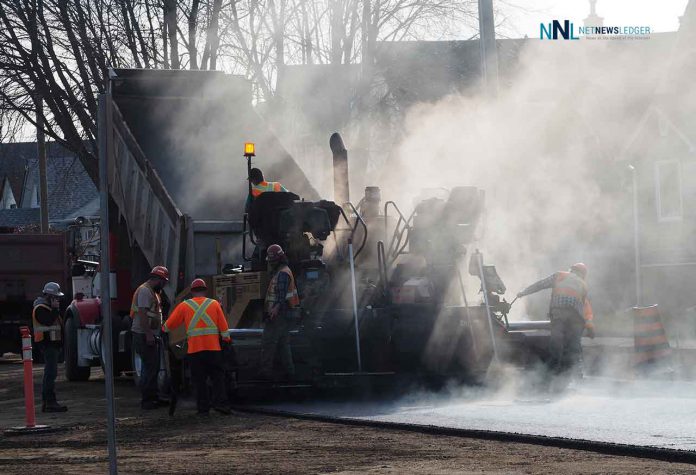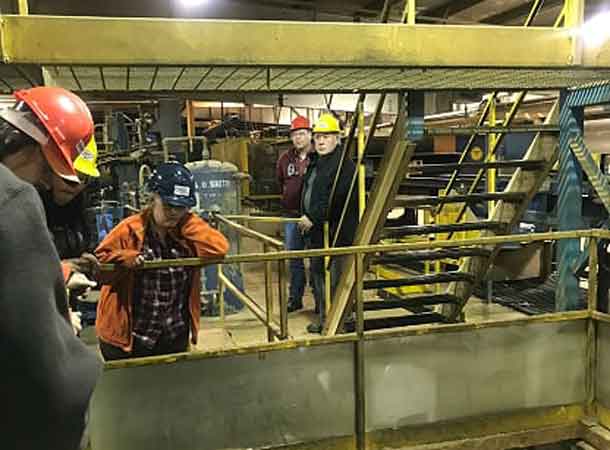KENORA — The Ontario government is investing more than $3.7 million to train 110 members of Treaty #3 First Nations communities for rewarding careers in construction. Through this investment, participants will gain the skills they need to start well-paying jobs twinning the TransCanada Highway 17 as construction craft workers, heavy equipment operators, general construction workers, and concrete workers. Some of these jobs pay as high as $44 an hour.
Monte McNaughton, Minister of Labour, Training and Skills Development, made the announcement today during a stop in Kenora on a tour of Northern Ontario. First Nations business and political leaders and local MPP Greg Rickford, Minister of Northern Development, Mines, Natural Resources and Forestry, and Minister of Indigenous Affairs, joined Minister McNaughton in making the announcement at the Seven Generations Education Institute.
“Our province faces a severe shortage of skilled workers, with tens of thousands of jobs in construction going unfilled daily,” said Minister McNaughton. “Many of these jobs pay six figures, with pension and benefits. Today’s investment will give First Nations people in Northern Ontario the training and skills they need to open the door to these meaningful career opportunities, helping build better lives for themselves and their loved ones.”
This project will be of primary benefit to members of four Kenora area First Nations in Treaty 3 territory, represented by the Niiwin Wendaanimok communities. It will prioritize people who are unemployed, underemployed, or at risk of losing their jobs. The communities involved include Washagamis Bay First Nation, Shoal Lake 40 First Nation, Wauzhusk Onigum First Nation, and Niisaachewan Anishinaabe Nation.
“Our government is once again demonstrating its commitment to supporting the skilled trades while promoting inclusion and opportunities in Indigenous communities,” said Minister Rickford. “Today’s investments will help to further bridge the opportunity gap for Indigenous workers, their families, and their communities. This project will be a game changer for many of Kenora’s Indigenous peoples who can now look forward to a more prosperous, secure future.”
Large construction projects in the Kenora region often rely on the use of outside labour. This has left many First Nations people without the skills and work experience to qualify for these jobs when they are available in the area.
Today’s announcement will address this skills gap some First Nations members face by providing participants with a variety of free training programs, including secondary school upgrading, driver’s education, workplace safety and certification and skills training needed for the Highway 17 and other projects.
Quick Facts
- This training investment provides each participant with up to $3,000 to cover costs such as transportation, childcare, and other expenses that could act as barriers to participation.Training runs from March 2021 until July 2023.
- To apply, contact Lana Major, Training Program Coordinator. Phone: (204) 979-2337 Email: lmajor@niiwinwendaanimok.com
- The funding for Niiwin Wendaanimok’s new project is supported through labour market transfer agreements between the Government of Canada and the Government of Ontario.
- The construction industry is an important part of the Ontario economy. In 2020, it employed about 500,000 people or 7.3 per cent of Ontario’s workforce.
- In the second quarter of 2021, there were 20,895 vacancies in the construction sector in Ontario.
- In 2020, the unemployment rate for Indigenous people in Ontario was 12.5 per cent compared with 9.5 per cent for non-Indigenous people.
- The Highway 17 project involves widening the highway from two to four lanes between the Manitoba-Ontario border and Kenora. This will reduce traffic and travel times, increase road safety and boost the local economy.
- About 5,000 to 7,500 vehicles travel each day on Highway 17 between the Manitoba border and Kenora.
“Widening Highway 17 between the Manitoba border and Kenora to reduce travel times and improve safety is part of our transportation plan for Northern Ontario. Together with Indigenous communities in the Kenora region, we are delivering on our shared goal of creating jobs, improving safety and building a better transportation system in the North,” comments Caroline Mulroney Minister of Transportation.
“For too long a whole wall of obstacles has kept job opportunities and job experience out of reach of our people. We’re very pleased that Ontario is partnering with our development corporation to secure good job opportunities and begin to overcome some of those capacity and other obstacles,” added Chief Chris Skead – Wauzhushk Onigum Nation.
“Historically, we Anishinaabeg in Treaty 3 held a key position in the governance, the economy and especially the transportation system of Turtle Island. With the support of some Supreme Court decisions and some willing partners, we are now reclaiming that position. This training project developed by our company in partnership with Ministry of Labour, Training and Skills Development is another step along our road to full participation in the life and economy of our Treaty territory. Fasten your seatbelt, there is so much more to come,” adds Chief Lorraine Cobiness -Niisaachewan Anishinaabe Nation.
“Following our laws and customs like Manito Aki Inakonigaawin has taken us to another good place,” shared Chief Vernon Copenace – Washagamis Bay First Nation.
“We know from experience that, given the chance, our young men and women can really shine. This project will help them make their contribution,” says Chief Vernon Redsky of Shoal Lake 40 First Nation.




